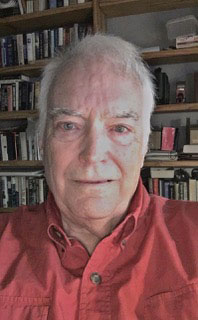Long hot summers

The dominate memory is the shimmering heat rising in light bending waves off the thick drifts of fine dust that powdered the country roads. And of the sticky asphalt of city streets that felt soft under foot when you stepped off the curb. The heat possessed tangible being. You could push a hand through the afternoon and feel the heat push back.
The counterpoint was water. Sprinklers slapped the evening with water for lawns fast turning brown in summer oven. Water fans rattled and dripped and shoved cool wet air into over‑heated bedrooms and parlors. Small children played in plastic wading pools, jumping in and out and running through the grass until the clippings made brown and green socks on their bare feet.
Darkness brought small relief. The sun abandoned its assault on the earth, but then the ground began to radiate its accumulation of heat into the night. It was a circular, slow and wearing process, carried out while the drone of June bugs under the street lamps competed in the heavy air with the cries of children playing games deep into the last sprinkles of daylight.
In time the sky would lose its colors, and the gray shadows turn black. The children, finally caught short by the expenditure of so much energy in such short time, would slide between cool white sheets and into dreams of days to come. As they slept, their elders would gather on screened porches armed with funeral home fans and long glasses of iced tea and talk quietly in the dark. In short time the grownups, too, would leave the night to the crickets and katydids.
The coolness arrived with the early hours before dawn. For a few hours, until the sun rose toward noon, bringing the temperature with it, the world was pleasant and crisp and green. The calendar moved one day ahead, and the promise of autumn one day closer.
Summer was baseball, twice a week under the lights at the ball parks and every day in some lot or backyard. Toss the bat, choose up sides, banish the last pick to the wilderness of right field and play ball. Rarely were there nine to a side, so you made do.
With not enough players to cover the diamond, the rules were gerrymandered to fit each situation, each day. And there were the other ball games.
To the shout of ‘Get on your horse!’ the batter tossed the ball into the air and sent it sailing toward the knot of would-be Willies or Dukes or Mickeys who gauged the flight of the ball against the blue sky and tried to run it down. And there was Blue Jay and scrub and others whose rules and names have faded with time.
Then there was baseball on the radio. The televised games were only aired on Saturday, when Dizzy Dean and Buddy Blattner called the play by play, but the Mutual Radio Network had a game every day. They were recreations, with the announcer sitting far from the action and calling the game from pitch-by-pitch accounts over the wire.
When no games were scheduled, Mutual would apply the same technique to revisiting the past with great games from history. To listen to the 1934 All Star game or the final contest of 1927 when Babe Ruth launched home run number 60 off the Senator’s Tom Zachary was better than any time machine invented by Tom Swift or Flash Gordon.
If you weren’t on the ball field, you might well be on your bike. The bicycle was the magic carpet that took you and your friends from one end of town to the other—which wasn’t that far, after all—and back again. You filled the saddlebags that you draped across the back fender rack with comic books and set off around the block as fast as you could peddle. Once around and then pass the bags to the next rider on the next bike. It was called Pony Express.
Another constant of summer, at least in our neighborhood, were the clubs. Every week or so, someone would form a club. We would dutifully meet each day, read the minutes of the last meeting and then have refreshments.
Having refreshments was the real reason for the club’s existence, and the menu varied little from week to week. It was Kool-Aid™ and cookies. After a few meetings, the club would dissolve, only to rise like a phoenix from the cookie crumbs as a new club at a different house with a new set of founders, but the same membership, and the cycle of meetings and minutes. Kool-Aid and cookies would be repeated.
Summers were an adventure. We used to listen with rapt envy to the stories our parents would tell of the things they did growing up. They all sounded so wondrous. But in retrospect, our own memories, filtered by time and purged of whatever minor disasters or petty annoyances that might have clouded contemporary judgments, have taken on that same aura. Memories, at least good ones, like wine, grow more robust and full bodied with time. And so it is with those of long hot summers of not so long ago.